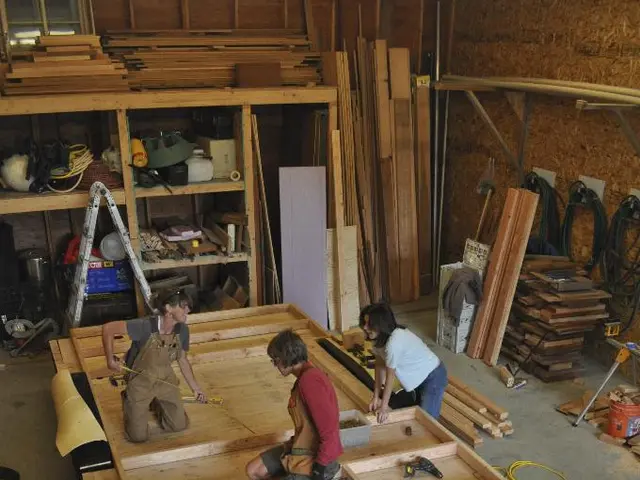Visit to Law Firm Schofield Sweeney by Legal Officials
In a recent insight day at Schofield Sweeney's central Leeds offices, a group of A-level and BTEC Law upper sixth students gained valuable insights into the world of law, particularly the non-traditional route of Level 7 Solicitor Apprenticeships.
Becca Foster, a Solicitor Apprentice at Schofield Sweeney, led a presentation on the apprenticeship route into law, sharing her experiences one year into her career. The event aimed to help students achieve their career ambitions in law by providing a taste of life as a solicitor and the skills required for the profession.
The visit began with a partner-led discussion about Schofield Sweeney as a commercial law firm, offering the students a comprehensive understanding of the firm's approach to legal practice. The students were then given the opportunity to learn about Schofield Sweeney's approach to probate law through a legal research activity.
The skills analysis session focused on professional skills important for solicitors, with Becca Foster and a partner from the firm guiding the students through the most important skills for their future careers. The students were encouraged to consider how they could evidence these skills from their own experiences in applications and interviews.
The students were also able to participate in a session discussing the firm's approach to professional skills development. This included a discussion on the difference routes into a legal career, including the traditional university route and Level 7 Solicitor Apprenticeships.
Level 7 Solicitor Apprenticeships typically last six years, combining work-based learning with formal study. Apprentices usually spend one day a week studying towards a legal qualification and four days working in the firm. The programme leads to a law degree (often an LLB) and a Legal Practice qualification, which may include an LLM (Masters) for those completing the full six-year program. Apprentices must pass the Solicitors Qualifying Examination (SQE) to qualify as a solicitor.
The apprenticeships are aimed at post-A-level students, paralegals, and chartered legal executives. The duration may be reduced for those progressing from other legal apprenticeships.
One of the key benefits of Level 7 Solicitor Apprenticeships is the hands-on experience gained by working alongside experienced lawyers, which enhances legal and commercial understanding. Apprentices also earn a salary while training and typically have their tuition fees covered by the employer, avoiding the usual costs associated with attending university and law school. There are also numerous networking opportunities, which can be beneficial for career advancement.
The apprenticeship provides a non-traditional route to becoming a solicitor, allowing individuals to qualify without needing a university degree first. By the end of the apprenticeship, individuals have over six years of quality legal experience, making them well-prepared for professional roles within the legal sector.
For specific experiences like Becca Foster's, direct information from Schofield Sweeney or testimonials from Becca Foster herself would be necessary. However, the general benefits and process outlined above provide a comprehensive understanding of what Level 7 Solicitor Apprenticeships entail.
In the presentation led by Becca Foster, she highlighted the pathway of Level 7 Solicitor Apprenticeships as a valuable opportunity for education-and-self-development and career-development, offering students a non-traditional route into the legal profession. The apprenticeship, lasting six years, combines work-based learning with formal study, providing learners with hands-on experience, a salary, and a chance to network, making it an attractive option for those seeking a career in law.







